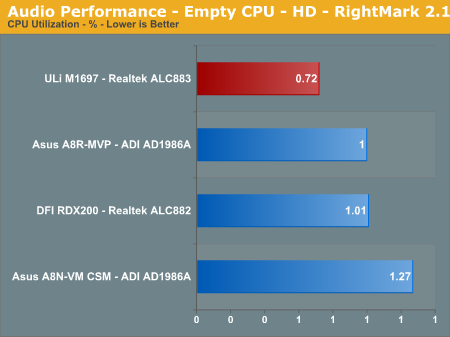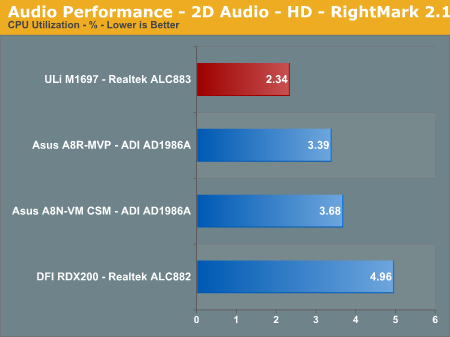FIRST LOOK: ULi M1697 for Athlon 64/x2
by Wesley Fink on December 13, 2005 12:05 AM EST- Posted in
- CPUs
Audio Performance
For audio testing, we used Rightmark 3D Sound CPU utilization test, which is the same benchmark run in our earlier nForce4 SLI and Ultra roundups. This benchmark measures the overhead or CPU utilization required by a codec or hardware audio chip. We tested performance using the latest version 2.1. Since we found that Version 2.1 yields different results from the earlier 1.24, we have only included test results with version 2.1.
It is important to point out that the latest ULi and ATI chipset motherboards have the necessary hooks to deliver Azalia High Definition audio. Those who have been complaining about the poor AC'97 audio present on most AMD boards should be very pleased to find Azalia HD on the ULi and ATI chipset boards. The nForce4 family does not offer the necessary chipset hooks to support HD Azalia audio.
Ethernet Performance
The one area where the ULi M1697 is disappointing is in their choice of an ethernet controller. Instead of using a Gigabit LAN, ULi only provided chipset support for a 10/100 Ethernet PHY. In practical terms, 10/100 is plenty of speed for most broadband connections, but with Ethernet quickly becoming the new standard, it is mildly disappointing that ULi still does not support Gigabit Ethernet on their chipsets. This is undoubtedly a cost-saving measure, but it mars an otherwise excellent AMD chipset.
Manufacturers can still implement Gigabit Ethernet with discrete chips, but it is more difficult to provide that solution on the preferred PCIe bus when there are no hooks for Gigabit PCIe in the chipset. Since most broadband ethernet connections barely tax 10Mb/s, this will really only matter to those who do sustained high-speed transfer of very large files over a true Gigabit network. Still, you should be aware that PCIe Gigabit Ethernet is always a better solution, and competitors are providing that capability in their current chipsets.
For audio testing, we used Rightmark 3D Sound CPU utilization test, which is the same benchmark run in our earlier nForce4 SLI and Ultra roundups. This benchmark measures the overhead or CPU utilization required by a codec or hardware audio chip. We tested performance using the latest version 2.1. Since we found that Version 2.1 yields different results from the earlier 1.24, we have only included test results with version 2.1.



It is important to point out that the latest ULi and ATI chipset motherboards have the necessary hooks to deliver Azalia High Definition audio. Those who have been complaining about the poor AC'97 audio present on most AMD boards should be very pleased to find Azalia HD on the ULi and ATI chipset boards. The nForce4 family does not offer the necessary chipset hooks to support HD Azalia audio.
Ethernet Performance
The one area where the ULi M1697 is disappointing is in their choice of an ethernet controller. Instead of using a Gigabit LAN, ULi only provided chipset support for a 10/100 Ethernet PHY. In practical terms, 10/100 is plenty of speed for most broadband connections, but with Ethernet quickly becoming the new standard, it is mildly disappointing that ULi still does not support Gigabit Ethernet on their chipsets. This is undoubtedly a cost-saving measure, but it mars an otherwise excellent AMD chipset.
Manufacturers can still implement Gigabit Ethernet with discrete chips, but it is more difficult to provide that solution on the preferred PCIe bus when there are no hooks for Gigabit PCIe in the chipset. Since most broadband ethernet connections barely tax 10Mb/s, this will really only matter to those who do sustained high-speed transfer of very large files over a true Gigabit network. Still, you should be aware that PCIe Gigabit Ethernet is always a better solution, and competitors are providing that capability in their current chipsets.










51 Comments
View All Comments
oneils - Tuesday, December 13, 2005 - link
Are you sure? The cards i've seen are all pci 2.1.